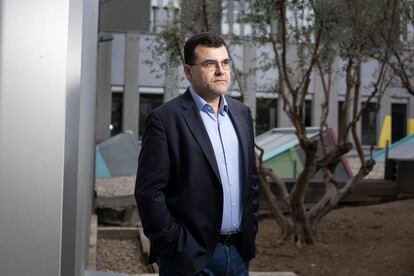Eduard Batlle, molecular biologist: ‘Tumor cells are high-speed evolution machines’
The scientist is a recipient of Catalonia’s National Research Award who studies colon cancer metastasis

The toughest place to live on Earth, according to Spanish scientist Eduard Batlle, must be the intestine wall. It deals with everything from digestion waste to all the carcinogens we ingest. Batlle, a molecular biologist and director of the Cancer Science Program at the Barcelona Biomedical Research Institute (IRB), has been studying colon cancer for 30 years. This type of cancer affects nearly two million people annually and leads to over 900,000 deaths worldwide.
Our interview takes place in a tiny cubicle inside his laboratory that functions as his office. Batlle’s recent research on tumors and insights into how tumor cells metastasize beyond the colon garnered him the National Research Award from the Catalonian government. He acknowledges that there is still a lot to learn about colon cancer, such as understanding how tumor cells evade current treatments.
Question. Each tumor is its own world. What makes colon tumors different?
Answer. What we’ve discovered is that these tumors are diseased stem cells in the intestinal wall. Colon cancer hijacks the continuous regeneration process of these cells. Another key finding is cellular plasticity, where tumor cells and normal cells can adjust to various types of stimuli or damage.
Q. What are the implications of these tumor cell characteristics?
A. This makes these tumors highly adaptable. When treated, some cells perish while others adjust and become resistant. Understanding how cells adapt and change can help enhance therapies significantly by potentially blocking this adaptability process.
Q. Are tumor cells outsmarting the scientists?
A. Tumor cells act as high-speed evolution machines. Their adaptability makes them incredibly resilient. In the past, we believed that targeting a specific gene mutation or using a particular therapy could eradicate them, but that’s not the case. We need to explore other strategies.
One issue hindering progress in colon cancer research is that we have a limited understanding of metastases, despite our extensive knowledge of the primary disease
Q. Is using only one strategy insufficient?
A. Yes, because when one signal is blocked, cells adapt. They can shift to different signals, alter their state, disguise themselves, develop new properties, and become resistant.
Q. It’s a little disheartening, isn’t it?
A. Treating these tumors is very complex, as we have seen in clinical settings. There have been limited therapeutic advancements in colon cancer in recent years. The primary treatment approach continues to revolve around chemotherapy, which, in many cases, does not lead to a cure.
Q. Is the limited availability of new drugs solely due to the tumor’s biology or our inability to refine the treatment approach effectively?
A. We struggle to find a cure not only due to its complexity but also because of our limited understanding. One issue hindering progress in colon cancer research is that we have a limited understanding of metastases, despite our extensive knowledge of the primary disease. The biology of the primary disease and metastases differs significantly. While much of biology focuses on the primary disease, metastases receive less attention as they are challenging to study and vary greatly.
Q. How do metastatic cells behave? What’s special about them?
A. They have high plasticity, and are capable of changing states and behaving distinctly in various organs due to differences in their microenvironment and the immune system. This results in differing therapy responses among metastases in a patient, underscoring the complexity we’re striving to fully understand.

Q. Your team identified malignant cancer cells that break off and spread. What are the implications of this discovery?
A. The study aimed to explore the hidden phase of metastatic disease in colon cancer patients. While most are diagnosed before metastasis, about 30% relapse due to residual disease. Cells breaking off from the primary tumor act as seeds, remaining undetected in our organs. Understanding these cells, their genetic composition, and how to eradicate them was our focus.
Q. So, could metastatic cells already exist when the primary tumor is found, even if they’re not visible?
A. Yes, micro-metastases or residual disease, though invisible to current detection methods, pose a risk of relapse and aggressive development, even when patients appear disease-free. While some cells may escape during surgery, it’s rare. The spread likely occurs pre-diagnosis, but the exact timing remains unclear.
Q. Is this invisible phase of the metastatic process also seen in other tumors?
A. Yes, all tumors that metastasize undergo this process. A new theory we proposed is that as metastasis grows, the tumor environment develops. This progression presents various treatment opportunities, as therapies effective for small metastases may become ineffective for larger ones. For instance, immunotherapy loses efficacy once metastases are advanced.
Q. Is the goal to move immunotherapy up to early disease stages to prevent metastases?
A. Yes, this is called preventive immunotherapy. Our research found that immunotherapy is effective when metastases are small and the tumor microenvironment is immature. In the models for our experiments, we explored neoadjuvant therapy before surgery, which activates the immune system systemically. This approach targets hidden residual cells in organs, preventing metastases. We believe this treatment will become a mainstay for various cancers due to its safety, cost-effectiveness, and potential to prevent relapses in patients with localized disease.
There is a terrible epidemic of colon cancer in young people
Q. What about patients already diagnosed with metastasis?
A. Metastases, once established, are highly complex. In colon cancer, there are increasing efforts to surgically address metastases. However, metastatic disease is systemic – multiple metastases in various organs. Each one responds differently to treatments. In advanced stages, systemic effects complicate cures, as metastases evolve and adapt to therapies.
Q. Are metastases the beginning of the end?
A. For certain tumors, it’s definitely bad news, while for others, there’s cause for optimism. Metastases are responsible for 95% of cancer-related deaths and usually have a poor prognosis. However, in cases like metastatic melanoma, immunotherapy offers hope for a cure. Significant progress has been made, as seen in breast cancer where treatments can manage the disease in the long-term. Unfortunately, for colon cancer, we lack the tools to control metastases effectively.
Q. Colon cancer rates are rising among young people and declining in older individuals. Why is this happening?
A. Colon cancer rates are dropping among older adults, possibly due to screenings. However, there’s a terrible epidemic of colon cancer in young people. The reasons are unclear – perhaps dietary changes, food additives or other factors. The disease in young people mirrors that in adults, pointing to early onset rather than a different condition. Young people may also be engaging in behaviors that increase their risk.
Sign up for our weekly newsletter to get more English-language news coverage from EL PAÍS USA Edition
Tu suscripción se está usando en otro dispositivo
¿Quieres añadir otro usuario a tu suscripción?
Si continúas leyendo en este dispositivo, no se podrá leer en el otro.
FlechaTu suscripción se está usando en otro dispositivo y solo puedes acceder a EL PAÍS desde un dispositivo a la vez.
Si quieres compartir tu cuenta, cambia tu suscripción a la modalidad Premium, así podrás añadir otro usuario. Cada uno accederá con su propia cuenta de email, lo que os permitirá personalizar vuestra experiencia en EL PAÍS.
¿Tienes una suscripción de empresa? Accede aquí para contratar más cuentas.
En el caso de no saber quién está usando tu cuenta, te recomendamos cambiar tu contraseña aquí.
Si decides continuar compartiendo tu cuenta, este mensaje se mostrará en tu dispositivo y en el de la otra persona que está usando tu cuenta de forma indefinida, afectando a tu experiencia de lectura. Puedes consultar aquí los términos y condiciones de la suscripción digital.









































